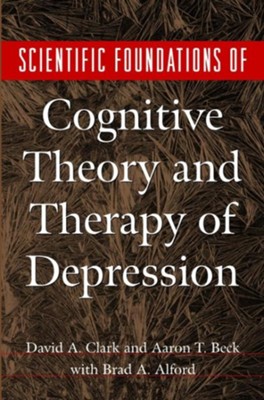Scientific Foundations of Cognitive Theory and Therapy of Depression


- ISBN: 0471189707, 9780471189701
- Page count: 504
- Published: 1999
- Format: Hardcover
- Publisher: Wiley
- Language:
- Author: David Clark
Based on decades of theory, research, and practice, this seminalbook presents a detailed and comprehensive review, evaluation, andintegration of the scientific and empirical research relevant toAaron T. Beck's cognitive theory and therapy of depression. Sinceits emergence in the early 1960s, Beck's cognitive perspective hasbecome one of the most influential and well-researchedpsychological theories of depression. Over 900 scientific andscholarly references are contained in the present volume, providingthe most current and exhaustive evaluation of the scientific statusof the cognitive theory of depression.
Though the application of cognitive therapy has been welldocumented in the publication of treatment manuals, the cognitivetheory of depression has not been presented in a unified manneruntil the publication of this book. Coauthored by the father ofcognitive therapy, Scientific Foundations of Cognitive Theory andTherapy of Depression offers the most complete and authoritativeaccount of Beck's theory of depression since the publication ofDepression: Causes and Treatment in 1967. Through its elaborationof recent theoretical developments in cognitive theory and itsreview of contemporary cognitive-clinical research, the bookrepresents the current state of the art in cognitive approaches todepression. As a result of its critical examination ofcognitive-clinical research and experimental informationprocessing, the authors offer many insights into the futuredirection for research on the cognitive basis of depression.
The first half of the book focuses on a presentation of theclinical phenomena of depression and the current version ofcognitive theory. After outlining important questions that havebeen raised with the diagnosis of depression, the book then tracesthe historical development of Beck's cognitive theory and therapythrough the 1960s and '70s. It presents the theoretical assumptionsof the model and offers a detailed account of the most currentversion of the cognitive formulation of depression.
The second half of the book provides an in-depth analysis of theempirical status of the descriptive and vulnerability hypotheses ofthe cognitive model. Drawing on over three decades of research, thebook delves into the scientific basis of numerous hypothesesderived from cognitive theory, including negativity, exclusivity,content specificity, primacy, universality, severity/persistence,selective processing, schema activation, primal processing,stability, diathesis-stress, symptom specificity, and differentialtreatment responsiveness.
"In 1967 the first detailed description of the cognitive theory ofdepression was published in Depression: Causes and Treatment by oneof us, Aaron T. Beck. The basic concepts of the theory laid out inthat volume still provide the foundation for the cognitive model 30years later. As well the first systematic investigations of thetheory described in the 1967 volume contributed to a paradigmaticshift in theory, research, and treatment of depression thatresulted in a very vigorous and widespread research initiative onthe cognitive basis of depression. The present book is intended toprovide a comprehensive and critical update of the developments incognitive theory and research on depression that have occurredsince the initial publication in the 1960s."–David A. Clark, fromthe Preface.















Review Scientific Foundations of Cognitive Theory and Therapy of Depression.